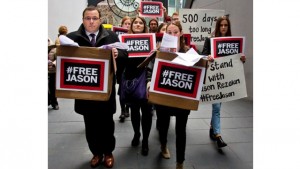
In this December 3, 2015 file photo, Ali Rezaian (left), the brother of Washington Post reporter Jason Rezaian, rallies with supporters to deliver a petition of 500,000 signatures to Iran’s United Nations mission asking for the release of his brother from prison. A source close to Iran’s judiciary confirmed to The Associated Press that Rezaian is one of four dual-national prisoners freed by Iran’s Government.
WASHINGTON, USA (AP) — America’s relationship with one of its most intractable foes took two giant leaps forward this weekend when Iran released four Americans in a prisoner swap after locking in last summer’s nuclear deal and receiving some $100 billion in sanctions relief.
The announcements culminated a stunning few days of activity for the Obama Administration, and particularly Secretary of State John Kerry, who led the diplomatic outreach to Tehran at President Barack Obama’s direction through years of slow-grinding negotiations.
Speaking from the White House, yesterday Obama hailed the “historic progress through diplomacy”, long the centrepiece of his foreign policy vision, instead of another war in the Middle East.
Three of the American detainees — Washington Post Reporter Jason Rezaian, former US Marine Amir Hekmati and Pastor Saeed Abedini — arrived in Germany en route to a US military hospital. They will return home after medical evaluations.
The fourth, Nosratollah Khosravi-Roodsari, opted to remain in Iran, officials said.
The Islamic Republic released the prisoners in exchange for pardons or charges dropped against seven Iranians — six of whom hold dual US citizenship — serving time for or accused of sanctions violations in the US. A fifth American, student Matthew Trevithick, who had been detained in Iran for roughly 40 days, was released separately.
For all the celebrations, the timing of the deal, finalised hours after Saturday night’s UN confirmation that Iran made good on pledges to significantly back away from atomic bomb-making capacity, suggested that the Americans possibly were used as pawns by the Iranian Government to win long-sought economic relief.
Critics of Obama’s Iran policy at home and abroad pounced on the details of the prisoner exchange and the new economic opportunities being afforded Tehran, while it still supports Syrian President Bashar Assad’s Government and the militant groups Hamas and Hezbollah.
“This deal is a problematic deal, and it reflects a pattern we have seen in the Obama Administration over and over again of negotiating with terrorists and making deals and trades that endanger US safety and security,” Texas Senator Ted Cruz, a GOP presidential candidate, said on Fox News Sunday.
Nevertheless, the back-to-back breakthroughs reflected painstaking diplomacy by Kerry and administration officials.
The efforts were beset by several hitches, including the detention of 10 US sailors by Iran last week in the Persian Gulf and US plans in late December to impose new sanctions on Iran for ballistic missile testing.
The sailors were released after Kerry’s intervention with Iranian Foreign Minister Mohammad Javad Zarif. The sanctions were delayed until Sunday after the US detainees left Iran.
US and Iranian officials hashed out the prisoner exchange over 11 or 12 meetings over a process that took a little longer than a year, sprouting from the even longer set of talks that led to last July’s landmark nuclear accord.
Things progressed significantly by November, when Iran was included for the first time in a meeting in Vienna on Syria’s civil war. Kerry and Zarif met there to discuss the prisoners.
“We actually shook hands thinking we had an agreement,” Kerry said. “I thought it was done.”
But the deal bogged down in Tehran and never went through.
“So we went back to work,” Kerry told reporters on his plane back to Washington late Saturday.
He described the negotiations as difficult, especially as the Iranians made what he said were unacceptable demands. Kerry said the United States made clear it wouldn’t release an accused murderer or narcotics offender.
“For a long time, this didn’t move because of the people they were asking for,” Kerry recalled. “We said, ‘No, and no, and no.’”
“And believe me, it’s hard when somebody says to you, ‘Hey, you give us this guy, we let them all out.’ And you have to say no. And you know you’re keeping people in a not very nice place for the next whatever number of months,” he said.
“But there have to be an enforcement of our principles and our standards here. And in the end, we came out in the right place on that.”
“In the end, the president made the call,” he said.
Obama pledged to counter vigorously Iran’s “destabilising behaviour” across the Mideast even while the US engages with the Islamic Republic. After the Americans had been freed, Obama announced economic sanctions against 11 individuals and entities as a result of a ballistic missile launch in October.
“We’re not going to waver in the defence of our security or that of our allies and partners,” Obama said.
But Obama said he decided “that a strong, confident America could advance our national security by engaging directly with the Iranian Government”.
Democratic lawmakers who supported the agreement applauded the sanctions announced Sunday. Five Democratic senators said in a joint letter to Obama that failure to impose the restrictions could encourage Tehran to violate international obligations with impunity.
In a reciprocal move, Obama said that six Iranian-Americans and one Iranian serving sentences or awaiting trial were being granted clemency. He emphasised that they were not charged with terrorism or any violent offences.
